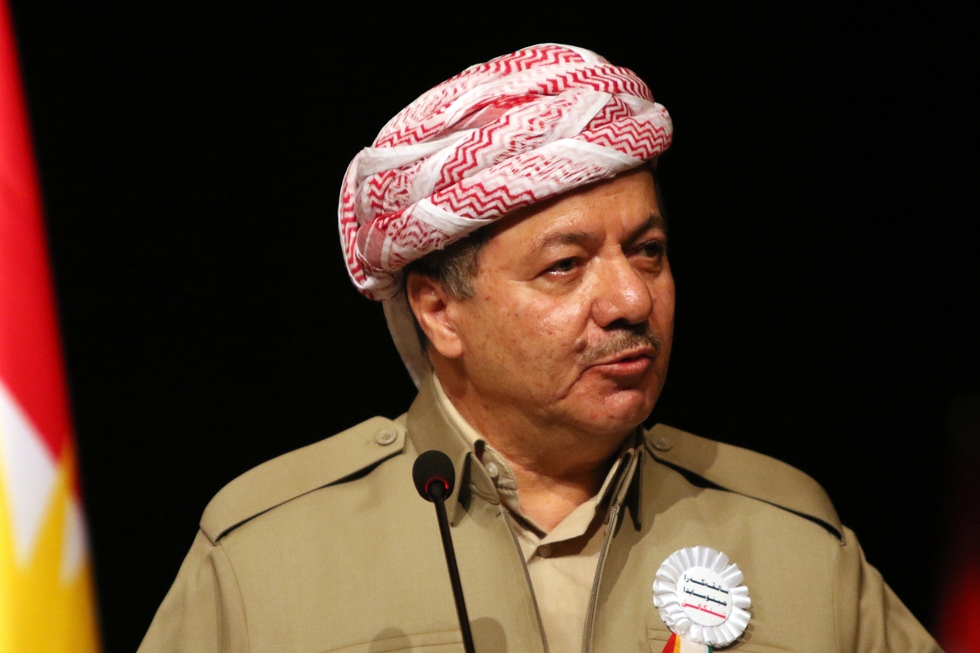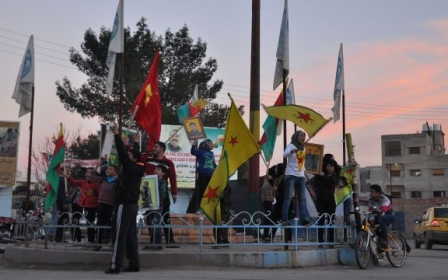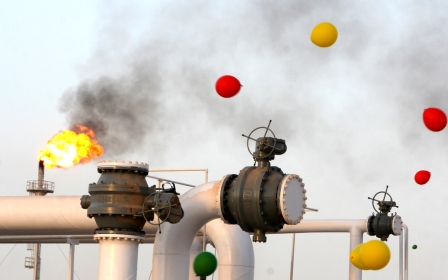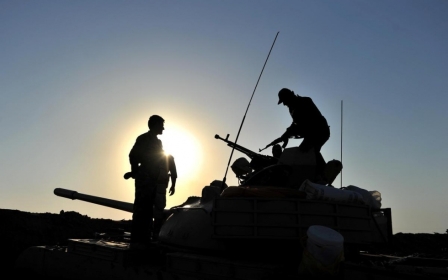ANALYSIS: No path out of crises yet for Iraq’s Kurds

ERBIL, Iraq - Party leaders in the Kurdistan Region of Iraq (KRI) will make another attempt this week to resolve the crisis over the future of the presidency, but few expect a breakthrough.
According to diplomats and local analysts, the battle for power is eroding investor confidence in a region which has been hit by a daunting series of recent shocks, from the collapse of the world oil price to the rise of the Islamic State group, and a huge influx of refugees.
A decade ago the KRI was an island of security while the Arab regions of Iraq were consumed by armed resistance to the US and British occupation, and the arrival of al-Qaeda to exploit the turbulence.
The KRI is still more stable than the rest of Iraq, huge areas of which are controlled by IS while a weak central government relies on Iranian-backed Shia militias to hold IS at bay.
But multiple crises - political, economic, and humanitarian - are mounting in the KRI and there is no short-term relief in sight.
The presidential term of Masoud Barzani, the head of the Kurdistan Democratic Party (KDP), ran out on 20 August.
The KDP wants it extended, just as it was in August 2013, but the other parties are demanding a reduction in the president’s powers and a shift to a parliamentary system with only a ceremonial role for the president as head of state.
The deadlock comes as the region’s budget is coming under severe strain, with many civil servants as well as troops in the armed forces - the Peshmerga - not having been paid for the last three months.
Some public sector workers took to the streets of the KRI’s second city Sulaimaniya in protest in August.
Relations with the federal government in Baghdad are one cause of the problem. They foundered largely over the future of oil revenues. Baghdad is supposed to pay 17 percent of government income to the KRI but in 2014 it gave nothing.
The KRI initially tried to patch things up by continuing to send oil to Baghdad but the government of Haider al-Abadi cut the payments Baghdad was supposed to make.
The KRI started selling its oil independently this spring by exporting it through Turkey to the Mediterranean port of Ceyhan where private brokers take charge.
Kurdistan's new oil triangle
The amount earned is not published, nor is the oil’s ultimate destination. Much of it is believed to end up in Israel, with some reports suggesting that as much as 70 percent of Israel’s oil requirement is fulfilled from Kurdish crude.
Western oil sources have told MEE on condition of anonymity that the KRI is thought to get some $850mn a month from its oil exports through Turkey. This is substantially less than the $1.1bn it got from Baghdad in 2013 before relations broke down.
It also barely covers the $750mn needed to cover public sector pay every month. The payroll is said to be wildly inflated since the region still has a patronage and clan system in which the two main political parties, the KDP and the Patriotic Union of Kurdistan (PUK), reward their supporters by giving them government jobs.
Thanks to these obligations as well as debts owed to foreign oil companies working in the KRI, public debt rose from around zero last year to nearly 20 per cent this year, according to the World Bank.
Roger Guiu, a research fellow at the Erbil think-tank Middle East Research Institute, reported recently that the KRI made an abortive effort this summer to obtain $5bn in loans from international banks.
But the rate requested by the banks in previous negotiations was 12 percent, higher even than the 8 percent required of Iraq, and there was little chance of this being reduced.
Foreign confidence was severely dented when IS captured Iraq’s second city, Mosul, in June last year and started advancing towards Erbil. Thousands of people fled and most expats hurriedly pulled out.
After several days and nights of US airstrikes IS was held back. Subsequently the Peshmerga regained most of the territory outside Mosul, including the strategically important Mosul Dam, which IS had seized.
Re-armed and re-trained, the Peshmerga now hold defence lines which seem secure.
But investment is yet to resume, and Erbil looks like a classic case of a boom town which has gone bust. Dozens of half-completed apartment blocks litter the outskirts of the city. Idle cranes stand everywhere, and gated communities with ambitious names like Dream City or Empire are full of unfinished homes or wasteland where no building work has started.
Around three-quarters of construction projects were financed by Turkish firms.
Adding to the KRI’s problems is a massive influx of refugees from Syria and internally displaced people from other parts of Iraq.
The numbers are hard to verify since many live in rented apartments until their money runs out and they are forced to move to camps.
Others may be economic migrants rather than refugees from war. The UN has calculated the influx of people to KRI as 1.32 million, including 210,000 refugees.
The KRI government puts the figure of internally displaced people at 1.8 million, around 70 percent of who are Arabs from Ramadi, Fallujah, Diyala, Tikrit and other cities taken over by IS at some point.
At least 10,000 are thought to have joined the huge refugee exodus to Europe in the last three months. The KRI’s total population has increased by 30 percent, say local officials, and some cities like Dohuk have seen a doubling in population.
Tensions with Turkey
The collapse of the ceasefire between the Turkish government and the Kurdistan Workers’ Party (PKK), the armed nationalist movement which fights for self-determination for Kurds in Turkey, has created new tensions between Erbil and Ankara after two decades of relative harmony.
Turkey has resumed bombing of PKK bases in Iraq’s Qandil mountains.
Although there is no love lost between the centre-right KRI parties and the left-wing PKK, Erbil’s officials are loathed to criticise the PKK strongly.
While Turkey and the European Union list the PKK as a terrorist organisation, it is tolerated in the KRI.
“You can’t be terrorist if you’re fighting IS,” said Karwan Jamal Tahir, the Kurdistan Regional Government’s high representative in Britain.
Even after the pipeline through Turkey was blown up this summer, reportedly by the PKK, they are cautious in attributing blame.
“I don’t know who did it. I don’t accuse anyone,” Fuad Hussein, Barzani’s chief of staff, told MEE.
Hemen Hawrami, head of the KDP’s foreign relations office, said the website of the PKK’s armed wing initially took responsibility for the sabotage but later said the decision was taken by local commanders, implying it was a wrong move.
Hussein and Hawrami as well as most independent analysts in Erbil expect the ceasefire will resume in Turkey whatever result emerges from the parliamentary elections called by President Recep Tayyip Erdogan for November.
“Neither the PKK nor Turkey can achieve anything by way of violence or military force”, Hawrami said.
Officials believe Erdogan launched the bombing raids on PKK bases in Qandil as an election move to win nationalist support among Turks and undermine the Kurdish political party which won 13 percent of the vote in elections earlier this year.
Ambivalence over Syrian Kurds
KRI officials also have an ambivalent attitude to the PKK-inspired movement of Syrian Kurds, known as the Democratic Union Party (PYD).
Since Syria’s President Bashar al Assad withdrew his combat troops from Syria’s largely Kurdish north-eastern region in 2012, the PYD’s troops have taken control and achieved several key victories against IS.
They have freed two key towns on the border with Turkey which IS seized, thereby blocking the flow of new IS volunteers into Syria.
Now they plan to move against a third one at Jarabulus.
In Erbil there is quiet admiration for the Syrian Kurds’ success, although officials support the PYD’s rival political parties. The US has been training and arming hundreds of Syrian Kurds at camps near Erbil and would like to see them join the fight against IS inside Syria.
But US efforts to get them accepted by the PYD have so far failed.
The most recent attempt came last month at a meeting between President Barzani and the PYD co-president, Saleh Muslim, which was organised and attended by Brett McGurk, the deputy US envoy to the coalition against IS.
Officials say Muslim continued to insist that all armed Syrian Kurds should fight under his forces’ command.
The other Syrian Kurds refused and remain in the KRI.
Faced with the region’s multiple uncertainties, some senior Kurds question Barzani’s strategy of keeping close relations with Turkey.
The oil pipeline to Turkey which is the KRI’s financial lifeline can be blocked at any moment by Turkey, as can the transfer payments which go through Turkish banks, they say.
To become a leading supplier of Israel’s energy needs is also risky, when the KRI is surrounded by anti-Israeli states.
“The KRG should have tried to solve its problems with Baghdad rather than becoming reliant on Turkey,” said Dr Mahmoud Othman, who sat for many years as an independent MP in the Iraqi parliament.
“They should have concentrated on Baghdad and sold their oil through Baghdad. Who can rely on Turkey?” he told MEE.
While acknowledging the problem of reaching agreement with Baghdad, Othman said: “No-one has tried to do a deal seriously enough. It’s still possible. We are weak. Baghdad is weak.”
Othman’s policy recommendations are not shared by officials, but they agree reluctantly with his analysis that the KRI has no strong cards.
The political and financial optimism that was widespread five or ten years ago has long gone, and no-one believes the KRI’s mass of crises can be overcome soon.
New MEE newsletter: Jerusalem Dispatch
Sign up to get the latest insights and analysis on Israel-Palestine, alongside Turkey Unpacked and other MEE newsletters
Middle East Eye delivers independent and unrivalled coverage and analysis of the Middle East, North Africa and beyond. To learn more about republishing this content and the associated fees, please fill out this form. More about MEE can be found here.




